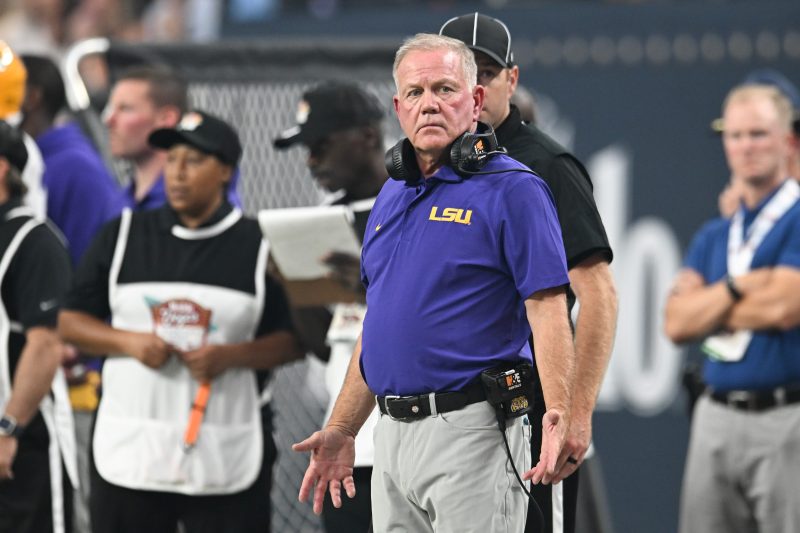On top of their massive annual salaries, college football coaches often receive bonuses at the end of every season − extra money based on their team’s academic performance or appearance in a bowl game.
Last year, though, at least three Power Four coaches gave up parts of bowl bonuses to which they were entitled.
LSU coach Brian Kelly and Utah coach Kyle Whittingham each signed amendments to their contracts that reduced their bowl bonuses for the 2023-24 season only, with Kelly foregoing $400,000 he was scheduled to make and Whittingham’s bonus being reduced by $100,000. Wisconsin’s Luke Fickell also could have received a portion of the team’s bonus for winning seven games, but the school said he did not receive any bonus money in 2023-24.
LSU athletics department spokesperson Zach Greenwell said in a statement that Kelly reduced his bowl bonus to offer additional support ‘following an increased investment into our football program.’
‘Brian and (wife) Paqui Kelly have been generous supporters of LSU Athletics since they arrived in Baton Rouge,’ Greenwell said in a statement on behalf of LSU athletics, which did not specify whether the money was redirected toward a specific project or fund.
‘This is not the first time they supported LSU financially in an impactful way. The Kelly family previously committed $1 million in support of an improved athletic training room and recovery suite. … We are grateful to the Kelly family for their commitment to LSU.’
Utah spokesperson Paul Kirk, meanwhile, declined to provide any additional information on the one-time reduction to Whittingham’s bowl bonus. He also declined to make Whittingham or athletics director Mark Harlan available for an interview.
While bonuses generally make up a small portion of a college football coach’s annual pay, they can be lucrative in some cases. According to USA TODAY Sports research, Football Bowl Subdivision coaches pocketed more than $15.5 million in bonuses last season, led by Michigan coach Jim Harbaugh, who got $3 million for helping lead the Wolverines to a national championship. Kalen DeBoer, who spent last season at Washington before taking over for Nick Saban at Alabama, also took home more than $1 million in bonuses.
Many six-figure bonus provisions are also all but automatic, such as the $500,000 that Kelly is due to receive every year for participating in a bowl game, a feat that LSU has achieved in 23 of the past 24 seasons. Last year, however, Kelly agreed to receive only $100,000 of that amount.
Whittingham, meanwhile, signed an amendment last October that reduced his bowl bonus to $175,000 from $275,000. The Utes finished 8-5 and lost to Northwestern in the Las Vegas Bowl last season.
Fickell’s bowl bonus provision is the most complicated of the group. Under the athletics department’s bonus policy, the team’s coaching staff earned a collective bonus of about $265,000 − roughly 4% of their combined base salaries − for the program’s seven-win season. If he had taken a proportionate share of the bonus pool, Fickell would’ve received $40,000. Wisconsin spokesperson Patrick Herb said the coach instead chose to distribute that money to the rest of his staff.
Follow the reporters on social media @Tom_Schad and @ByBerkowitz.
